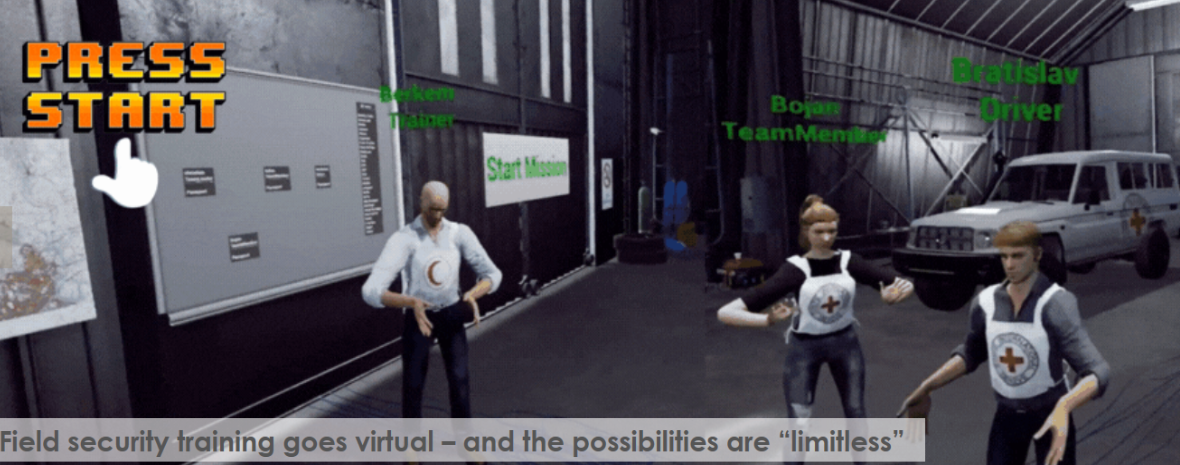Consider this for a moment.
You are an ICRC delegate attending a virtual security briefing ahead of a field trip. Inside the virtual briefing room, you’re joined by colleagues from ICRC Afghanistan and ICRC Mozambique, the Norwegian Red Cross (Norcross), the Iraqi Red Crescent and a trainer from the ICRC’s Security and Crisis Management Support (SCMS) Unit.
As avatars, you communicate live with each other while handling objects such as mobile phones, torches and first aid equipment. And even as you pack your virtual luggage with required medicine, you’re also mentally preparing for the next simulation where you will need to negotiate your way past a checkpoint.
And you are able to do all this from your sofa at home (or office, depending) because in reality, you and your colleagues are all thousands of kilometers apart, wearing headsets.
Welcome to one of the humanitarian sector’s first remote, multiplayer virtual reality (VR) training programmes aimed at improving security awareness in high-risk environments.
The “VR Field Security Experience” is the fruit of two years’ collaboration between colleagues from the ICRC’s Virtual Reality Unit (VRU), SCMS and the NorCross. It’s funded by the Norwegian foreign ministry through the NorCross Innovation Unit.
The VR scenario simulates many aspects of a field trip, including the pre-departure briefing, security checks and an encounter at an armed checkpoint. Users can choose between five characters: team leader, driver and other team members. A trainer oversees the exercise.

“The strength of this project is the multiplayer aspect as well as its high level of immersion,” explains Abraham Doblado, SCMS’s Global Capacity Building Coordinator.
“The participants have to get organized, they have to communicate, they have to know what material to take on the field trip. They should also, based on the information they receive in the briefing, discuss the security risks.”
Doblado says that the more colleagues tested the different simulation features, the more they realized that the security training opportunities “were somehow limitless.”
“While the primary objective of this VR simulation was to prepare staff to handle potential incidents at an armed checkpoint, for example, it soon became clear that all learning objectives pertaining to a field mission could be addressed from defining the roles and responsibilities of the team members, the security rules, the objective and impact of the mission versus the security risk, through to stakeholder mapping, notifications and staff health safety measures – all part of the Minimum Safety Requirements for ICRC missions.”
SCMS says the VR Field Security Experience will be further developed and enhanced, adding aspects such as how to prepare mentally for a field trip. It foresees multiplayer security training simulations being integrated into several courses including the Staff Integration Programme, Critical Incident Management Training, Security and Crisis Management, and Senior Security Risk Management.
Christian Rouffaer, Head of the ICRC’s Virtual Reality Unit, says each facilitator, National Society or organization that wants to use the field security simulation can fine-tune it according to their needs.
“Nothing is scripted. It’s up to each trainer to fix the role-play situation. At the end of the simulation, the participants review the exercise and identify what went well and the lessons to be learned. The big added-value is that the trainer and the team members can join from anywhere in the world,” says Rouffaer.
“Developing such a tool through which we can train over the internet while we are in different locations on the other side of the globe is a benefit for the Norwegian Red Cross and many other National Societies,” says Toon Vandenhove, NorCross Security Coordinator.
This sentiment was echoed by Fabrizio Leone, the Norwegian Red Cross’s Institutional Partnerships Coordinator: “For Norcross, this is a story about Movement cooperation, because we see in the ICRC a strong partner for humanitarian innovation. It’s also a story about thinking outside the box, because supporting the development of a virtual reality scenario was not exactly in our action plans. But we saw an opportunity, and the potential, to challenge our way of thinking and bring in a new way of learning. It’s also a story about COVID-19, because we were forced to remote work and that enabled us to see the value of using a digital twin – virtual reality – to replace traditional, in-person training.”
The technology will be shared with the Movement’s Security Focal Point Network to increase training opportunities and awareness on personal security management in high-risk environments among National Society staff and volunteers.

